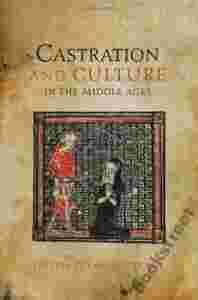|
Castration and castrati have always been facets of
western culture, from myth and legend to law and
theology, from eunuchs guarding harems to the
seventeenth- and eighteenth-century castrati singers.
Metaphoric castration pervades a number of medieval
literary genres, particularly the Old French fabliaux -
exchanges of power predicated upon the exchange or
absence of sexual desire signified by genitalia - but
the plain, literal act of castration and its
implications are often overlooked. This collection
explores this often taboo subject and its implications
for cultural mores and custom in Western Europe, seeking
to demystify and demythologize castration. Its subjects
include archaeological studies of eunuchs; historical
accounts of castration in trials of combat; the
mutilation of political rivals in medieval Wales;
Anglo-Saxon and Frisian legal and literary examples of
castration as punishment; castration as comedy in the
Old French fabliaux; the prohibition against genital
mutilation in hagiography; and early-modern anxieties
about punitive castration enacted on the Elizabethan
stage. The introduction reflects on these topics in the
context of arguably the most well-known victim of
castration in the middle ages, Abelard. Larissa Tracy is
Associate Professor of Medieval Literature at Longwood
University. Contributors: Larissa Tracy, Kathryn Reusch,
Shaun Tougher, Jack Collins, Rolf H. Bremmer Jr, Jay
Paul Gates, Charlene M. Eska, Mary A. Valante, Anthony
Adams, Mary E. Leech, Jed Chandler, Ellen Lorraine
Friedrich, Robert L.A. Clark, Karin Sellberg, Lena
Wånggren
|
|

